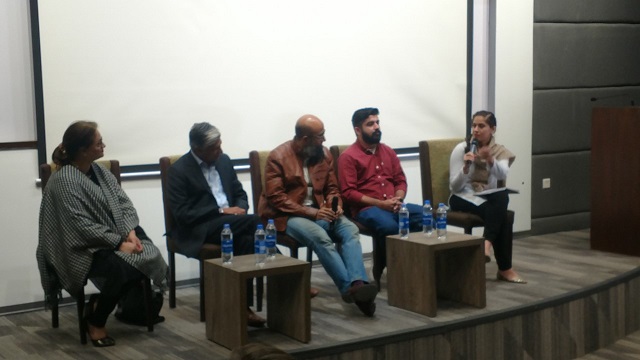
Journalist Sahar Habib Ghazi moderated the panel discussion with journalists Lubna Jerar Naqvi, Ayaz Khan, Shahzeb Ahmed and Farhan Mallick sharing their views on the challenges and hurdles journalists face in light of the current ‘boom and bust’ of the media industry in the country.
Naqvi, Head of Content Social Media at Geo News, spoke about the laws that were being formulated by the Karachi Union of Journalists (KUJ) for the protection of journalists and other media professionals.
“Journalists have no rights in the country, we don't even recognise media as a formal industry and that's why we see that journalists have no rights,” she said. “We don’t see journalists and media workers standing up for their own rights because they hardly know what their rights are.”
Mallick, news director at Samaa TV, spoke on the need for the media industry to not only serve the purpose of propagating information amongst the general public but to also educate and stand up for the issues that matter.
Citizen journalism: New startup to promote parallel reporting
“Media is supposed to stand up against the powerful, ask critical questions and talk about the issues affecting the marginalised and oppressed in the country,” he added.
Mallick also highlighted the urgency for media organisations to find new business models that can sustain media platforms in the long run.
“One model that we now see is that of The Guardian, which is driving its revenue through a crowdfunding model,” he said. “New York Times is also successful in sustaining itself through a subscription model,” he added.
Naqvi highlighted the emerging trends of how news is consumed by young consumers as they share stories that aren’t even considered newsworthy by traditional media.
“Currently, models of how media industry is run aren’t changing. We see that traditional media is being increasingly driven by social media,” she said.
Naqvi further stressed the need for media organisations to showcase content that is authentic, verified and ethical.
Citizen journalism is the new media: experts
Khan, journalist at Express News, added how smartphones were emerging as a new tool through which news is sourced nowadays. “My kids don’t even watch television because social media is the big source of news for them,” he said.
Nevertheless, Khan disagreed with the notion that print media would phase out in the next ten years.
Speaking on how digital is the future for journalism all around the world, Mallick said that Google metrics were increasingly being driven by healthy content, organic shares and the time people spent on engaging with the content of the website.
“We have to be mindful of the fact that quality content will win the race in the long term,” he said.
Ghazi urged journalists and media professionals to invest in the need to better understand their audience.
“I think the current business model is bad for journalism. We need a business model that links journalists directly to audiences without the middlemen” she said. “It’s a time of disruption that we see for the media industry and technology is changing the way we deliver the news."


1725612926-0/Tribune-Pic-(8)1725612926-0-165x106.webp)





1732176172-0/Untitled-design-(8)1732176172-0-270x192.webp)
1732175528-2/Untitled-design-(5)1732175528-2-270x192.webp)







COMMENTS
Comments are moderated and generally will be posted if they are on-topic and not abusive.
For more information, please see our Comments FAQ